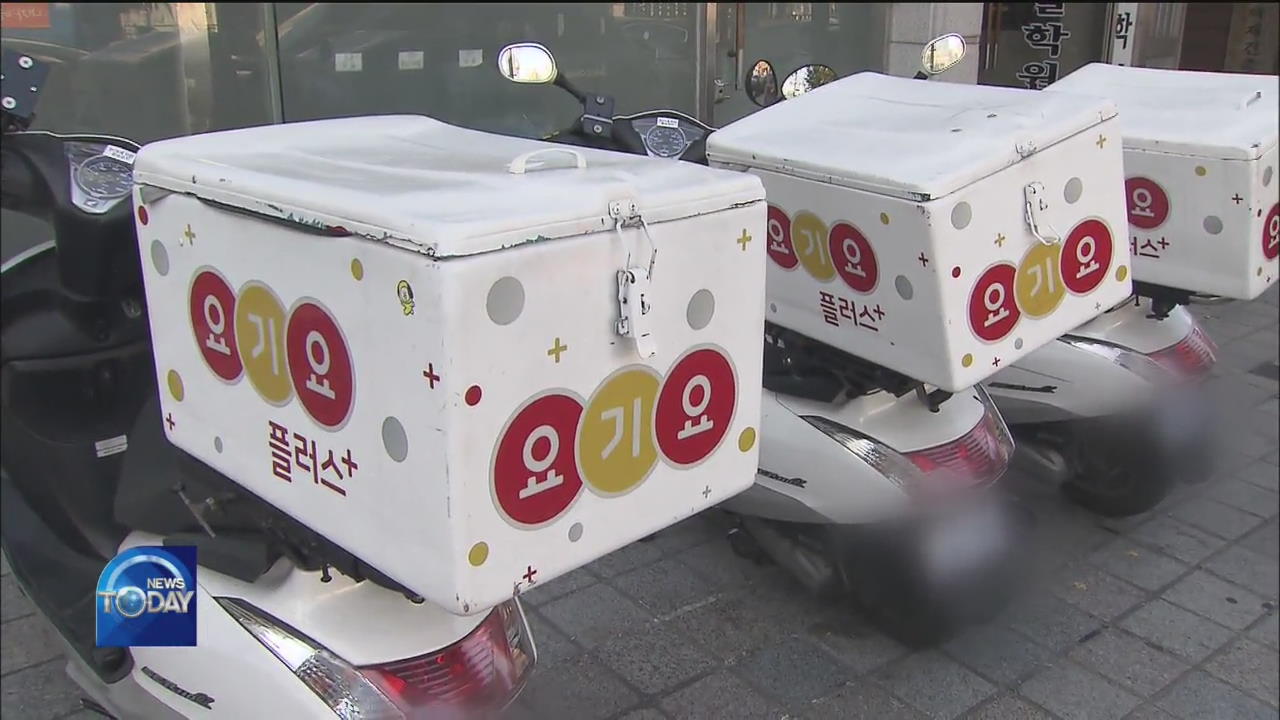EMPLOYMENT STATUS OF DELIVERY WORKERS
입력 2019.11.06 (15:00)
수정 2019.11.06 (16:45)
읽어주기 기능은 크롬기반의
브라우저에서만 사용하실 수 있습니다.
[Anchor Lead]
Many of you might be aware that food delivery services are very much common in Korea, and it's not difficult to see delivery people working around the clock. The labor Ministry says that delivery people who work for the local food delivery app Yogiyo should be viewed as salaried workers. The ministry believes that though they are technically individual business operators, the company oversees their work attendance and gives orders, treating them no different than as a full-time employee. This latest assessment is expected to serve as a benchmark in determining the employment status of delivery workers whose numbers are increasingly rising.
[Pkg]
Kim worked as a delivery person for the popular Korean delivery app Yogiyo. He was legally defined as a private business owner, but his work environment and roles were no different than a full-timeemployee at the firm. He received frequent text messages from the company warning him against absence without notice and alerting him that he can't turn down his predetermined work schedule. Delivery orders were forcibly designated and he was even dispatched to other work sites.
[Soundbite] (FORMER YOGIYO DELIVERY PERSON(VOICE MODIFIED)) : "It was a typical office work pattern. I had to report when I came in and our meal times were set by managers."
Five of these delivery workers filed a petition with a district labor office, requesting recognition of worker status. The Seoul District Employment and Labor Office sided with the workers, saying they should be treated as a salaried worker. The office cited the highly subordinate nature of their employment, whether it be in their work hours or work patterns. The decision by the labor office is the first of its kind regarding delivery workers. Recognition as salaried workers oblige companies to pay them various stipends. The workers can also be protected under the National Labor Relations Act.
[Soundbite] GOO GYO-HYEON(RIDER UNION) : "Platform companies advertise innovation but in fact, they make money through illegal activities."
However the labor ministry added that its decision only applies to the five individuals who filed the petition, noting that they did not suffer any back wages. Workers at other delivery app platforms have similar claims. Their labor unions also plan to campaign for eradicating contract-related irregularities.
Many of you might be aware that food delivery services are very much common in Korea, and it's not difficult to see delivery people working around the clock. The labor Ministry says that delivery people who work for the local food delivery app Yogiyo should be viewed as salaried workers. The ministry believes that though they are technically individual business operators, the company oversees their work attendance and gives orders, treating them no different than as a full-time employee. This latest assessment is expected to serve as a benchmark in determining the employment status of delivery workers whose numbers are increasingly rising.
[Pkg]
Kim worked as a delivery person for the popular Korean delivery app Yogiyo. He was legally defined as a private business owner, but his work environment and roles were no different than a full-timeemployee at the firm. He received frequent text messages from the company warning him against absence without notice and alerting him that he can't turn down his predetermined work schedule. Delivery orders were forcibly designated and he was even dispatched to other work sites.
[Soundbite] (FORMER YOGIYO DELIVERY PERSON(VOICE MODIFIED)) : "It was a typical office work pattern. I had to report when I came in and our meal times were set by managers."
Five of these delivery workers filed a petition with a district labor office, requesting recognition of worker status. The Seoul District Employment and Labor Office sided with the workers, saying they should be treated as a salaried worker. The office cited the highly subordinate nature of their employment, whether it be in their work hours or work patterns. The decision by the labor office is the first of its kind regarding delivery workers. Recognition as salaried workers oblige companies to pay them various stipends. The workers can also be protected under the National Labor Relations Act.
[Soundbite] GOO GYO-HYEON(RIDER UNION) : "Platform companies advertise innovation but in fact, they make money through illegal activities."
However the labor ministry added that its decision only applies to the five individuals who filed the petition, noting that they did not suffer any back wages. Workers at other delivery app platforms have similar claims. Their labor unions also plan to campaign for eradicating contract-related irregularities.
■ 제보하기
▷ 카카오톡 : 'KBS제보' 검색, 채널 추가
▷ 전화 : 02-781-1234, 4444
▷ 이메일 : kbs1234@kbs.co.kr
▷ 유튜브, 네이버, 카카오에서도 KBS뉴스를 구독해주세요!
- EMPLOYMENT STATUS OF DELIVERY WORKERS
-
- 입력 2019-11-06 15:08:59
- 수정2019-11-06 16:45:17

[Anchor Lead]
Many of you might be aware that food delivery services are very much common in Korea, and it's not difficult to see delivery people working around the clock. The labor Ministry says that delivery people who work for the local food delivery app Yogiyo should be viewed as salaried workers. The ministry believes that though they are technically individual business operators, the company oversees their work attendance and gives orders, treating them no different than as a full-time employee. This latest assessment is expected to serve as a benchmark in determining the employment status of delivery workers whose numbers are increasingly rising.
[Pkg]
Kim worked as a delivery person for the popular Korean delivery app Yogiyo. He was legally defined as a private business owner, but his work environment and roles were no different than a full-timeemployee at the firm. He received frequent text messages from the company warning him against absence without notice and alerting him that he can't turn down his predetermined work schedule. Delivery orders were forcibly designated and he was even dispatched to other work sites.
[Soundbite] (FORMER YOGIYO DELIVERY PERSON(VOICE MODIFIED)) : "It was a typical office work pattern. I had to report when I came in and our meal times were set by managers."
Five of these delivery workers filed a petition with a district labor office, requesting recognition of worker status. The Seoul District Employment and Labor Office sided with the workers, saying they should be treated as a salaried worker. The office cited the highly subordinate nature of their employment, whether it be in their work hours or work patterns. The decision by the labor office is the first of its kind regarding delivery workers. Recognition as salaried workers oblige companies to pay them various stipends. The workers can also be protected under the National Labor Relations Act.
[Soundbite] GOO GYO-HYEON(RIDER UNION) : "Platform companies advertise innovation but in fact, they make money through illegal activities."
However the labor ministry added that its decision only applies to the five individuals who filed the petition, noting that they did not suffer any back wages. Workers at other delivery app platforms have similar claims. Their labor unions also plan to campaign for eradicating contract-related irregularities.
Many of you might be aware that food delivery services are very much common in Korea, and it's not difficult to see delivery people working around the clock. The labor Ministry says that delivery people who work for the local food delivery app Yogiyo should be viewed as salaried workers. The ministry believes that though they are technically individual business operators, the company oversees their work attendance and gives orders, treating them no different than as a full-time employee. This latest assessment is expected to serve as a benchmark in determining the employment status of delivery workers whose numbers are increasingly rising.
[Pkg]
Kim worked as a delivery person for the popular Korean delivery app Yogiyo. He was legally defined as a private business owner, but his work environment and roles were no different than a full-timeemployee at the firm. He received frequent text messages from the company warning him against absence without notice and alerting him that he can't turn down his predetermined work schedule. Delivery orders were forcibly designated and he was even dispatched to other work sites.
[Soundbite] (FORMER YOGIYO DELIVERY PERSON(VOICE MODIFIED)) : "It was a typical office work pattern. I had to report when I came in and our meal times were set by managers."
Five of these delivery workers filed a petition with a district labor office, requesting recognition of worker status. The Seoul District Employment and Labor Office sided with the workers, saying they should be treated as a salaried worker. The office cited the highly subordinate nature of their employment, whether it be in their work hours or work patterns. The decision by the labor office is the first of its kind regarding delivery workers. Recognition as salaried workers oblige companies to pay them various stipends. The workers can also be protected under the National Labor Relations Act.
[Soundbite] GOO GYO-HYEON(RIDER UNION) : "Platform companies advertise innovation but in fact, they make money through illegal activities."
However the labor ministry added that its decision only applies to the five individuals who filed the petition, noting that they did not suffer any back wages. Workers at other delivery app platforms have similar claims. Their labor unions also plan to campaign for eradicating contract-related irregularities.
이 기사가 좋으셨다면
-
좋아요
0
-
응원해요
0
-
후속 원해요
0










![[HEADLINE]](https://news.kbs.co.kr/data/news/2019/11/06/4318172_10.jpg)




![[단독] “유명 가수와 일하게 <br>해줄게”…3억 뜯어낸 화장품 업체 대표 체포](/data/news/2024/05/03/20240503_teRPrm.jpg)

이 기사에 대한 의견을 남겨주세요.